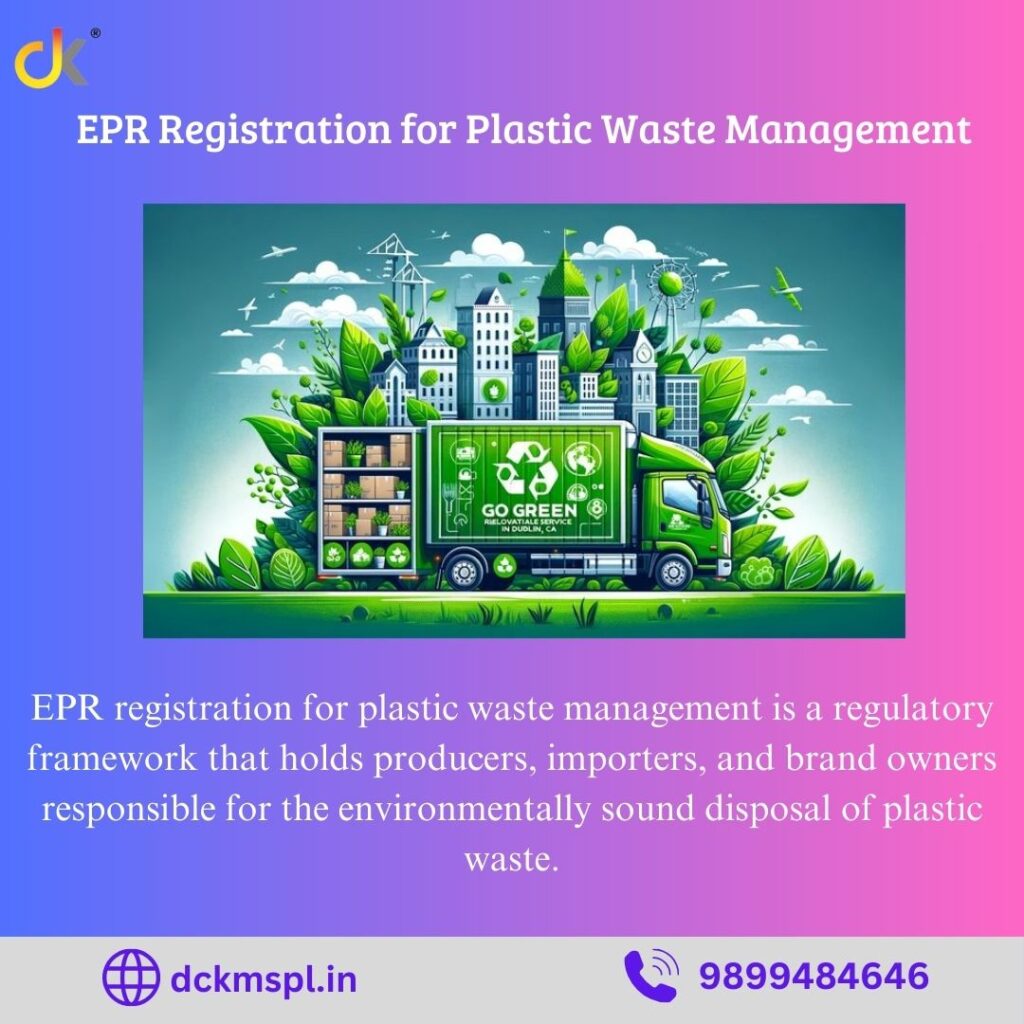Plastic waste has become one of the most pressing environmental issues globally. To combat this growing crisis, Extended Producer Responsibility (EPR) for plastic waste management has emerged as a crucial regulatory framework. It places the responsibility of managing and recycling plastic waste on the producers, importers, and brand owners (PIBOs). Through EPR registration, these stakeholders are mandated to manage the plastic they generate, fostering a more sustainable and eco-friendly approach to plastic usage.
What is EPR?
EPR registration for plastic waste management is a policy approach where producers take responsibility for the lifecycle of their products, including post-consumer disposal. In the context of plastic waste, this means that companies that manufacture or sell plastic products must ensure that the plastic waste generated from their products is effectively collected, processed, and recycled, rather than ending up in landfills or oceans.
Why is EPR Necessary for Plastic Waste?
Plastic pollution has devastating effects on the environment, wildlife, and human health. Plastics take hundreds of years to decompose, clogging landfills, polluting oceans, and harming marine life. Moreover, the improper disposal of plastic contributes to soil and water contamination, with microplastics infiltrating food chains and ecosystems.EPR is designed to reduce the environmental impact of plastic waste by holding manufacturers accountable for the entire lifecycle of their products, thereby promoting a circular economy. It encourages businesses to reduce plastic usage, improve waste management practices, and develop more sustainable packaging solutions.
Key Elements of EPR Registration for Plastic Waste
- Producer Responsibility
Under EPR, the onus is on producers to manage the waste generated from their products. This includes plastic packaging, containers, and other plastic-related waste. Companies must create and implement waste management plans to collect, process, and recycle the plastic waste they generate. - Regulatory Framework
Each country has its own set of regulations governing EPR. In India, for example, the Central Pollution Control Board (CPCB) oversees EPR registration for plastic waste management. Companies must comply with the rules laid out by these authorities, which may include specific recycling targets, reporting obligations, and timelines for compliance. - EPR Registration Process
To be compliant with EPR rules, companies need to go through a registration process. This typically involves:- Application Submission: Companies must submit their EPR registration application, detailing the type and quantity of plastic products they produce, import, or sell.
- Waste Management Plan: A detailed plan outlining how the company intends to manage the plastic waste generated from its products must be submitted. This includes strategies for collection, segregation, and recycling.
- Implementation of Collection Mechanisms: Once registered, companies must implement systems to collect plastic waste from consumers and ensure it is sent for recycling or environmentally safe disposal.
Benefits of EPR Registration for Plastic Waste Management
- Environmental Impact Reduction
By holding companies accountable for plastic waste, EPR helps reduce the amount of plastic that ends up in landfills, oceans, and other natural environments. It encourages recycling and promotes the responsible disposal of plastic products, helping to mitigate pollution and its adverse effects. - Corporate Sustainability
EPR registration boosts a company’s sustainability profile. Companies that comply with EPR regulations are seen as environmentally responsible, which can enhance their brand reputation. In today’s market, consumers increasingly favor brands that prioritize sustainability and environmental conservation. - Consumer Awareness and Participation
EPR programs also engage consumers by promoting awareness of recycling and waste management. When producers implement take-back systems and recycling initiatives, consumers are encouraged to participate, fostering a more responsible and conscious consumer culture.
Challenges of EPR for Plastic Waste
While EPR has numerous benefits, it also presents challenges for companies, especially small- and medium-sized enterprises (SMEs). Some of the challenges include:
- High Cost of Compliance: Implementing EPR measures, such as waste collection and recycling systems, can be expensive, especially for smaller businesses.
- Lack of Infrastructure: In many regions, there is inadequate infrastructure for proper plastic waste collection and recycling, making it difficult for companies to meet their EPR obligations.
- Coordination with Third-Party Agencies: Companies must often partner with waste management agencies, recyclers, and government authorities to fulfill their EPR requirements, which can be complex and time-consuming.
Conclusion
EPR registration for plastic waste management is a crucial step toward mitigating plastic pollution and promoting sustainability. By placing the responsibility on producers to manage their plastic waste, EPR encourages better waste management practices, supports recycling efforts, and contributes to the creation of a circular economy. Though challenges remain in terms of infrastructure and cost, the long-term benefits of EPR make it an essential strategy for tackling the global plastic waste crisis.
